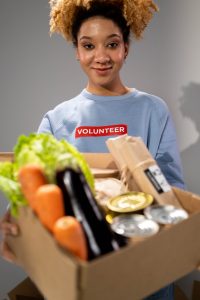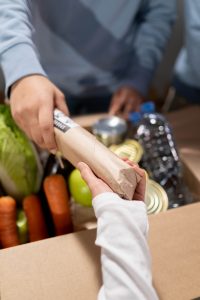Hello, I am Valentine, the new French ESC volunteer in Amazonas. I am 21 years old and I am doing a gap year during my studies in Communication. Each month, I will write about an important date. I decided for October to talk to you about a topic that inspired me a lot : Poverty, through the International Day for the Eradication of Poverty.
The 17th October was the International Day for the Eradication of Poverty. Among all the important dates of this months, this one topic is a little bit more connected to our work and our goals as an NGO. “Poverty is a state or condition in which a person or community lacks the financial resources and essentials for a minimum standard of living. Poverty means that the income level from employment is so low that basic human needs can’t be met.” (1) But as Nelson Mandela said : “Poverty is not an accident like slavery and apartheid it is man-made and can be removed by the actions of human being”(2). That’s what we will see in this article.
International day context
The Sustainable Development Goals (SDGs), also known as the Global Goals, were adopted by the United Nations in 2015 as a universal call to action to end poverty, protect the planet, and ensure that by 2030 all people enjoy peace and prosperity. Countries have committed to prioritize progress for those who’re furthest behind. The SDGs are designed to end poverty, hunger, AIDS, and discrimination against women and girls. The creativity, knowhow, technology and financial resources from all of society is necessary to achieve the SDGs in every context. “No Poverty” turns out to be the 1st out of 17 goals because it is the greatest global challenge and an indispensable requirement for sustainable development.
The SDGs are a bold commitment to finish what we started, and end poverty in all forms and dimensions by 2030. This involves targeting the most vulnerable, increasing basic resources and services, and supporting communities affected by conflict and climate-related disasters.
Some mutual aid and solidarity that took place
To mention it, the 26th October was the World mutual Aid day, which is related to poverty and the COVID-19 crisis that we currently face. The COVID-19 crisis increased the poverty ; more than 71 millions of people have fallen into poverty in 2020. The slowdown in progress on poverty reduction since 2015 has been further set back by the COVID-19 pandemic, with the global rate of extreme poverty rising in 2020 for the first time in over 20 years. The triple threat of COVID-19, conflict and climate change makes the global goal of ending poverty by 2030 unachievable unless immediate and substantial policy actions are taken.
The COVID-19 crisis has demonstrated the importance of social protection systems for protecting health, employment and income, with many new social protection measures introduced in 2020 as a result. However, 4 billion people worldwide are still without any social protection, most of whom are poor and vulnerable
One of the examples of mutual aid and solidarity that took place during the crisis and played an important role against poverty is in France: a lot of students, because they lost their job or because of the lack of financial resources due to COVID-19, couldn’t have access to decent food. A lot of associations and solidarity grocery store were created to help out these student who lost everything: for example the Association Linkee. Student precariousness is a reality that the health crisis has only increased and made visible.
Regarding Croatia, not only people had to face the COVID-19 crisis, but a series of earthquakes that happened in the last week of 2020. It have done serious damages in one of Europe’s poorest regions. There is something politically relevant that happened following the earthquake; It is the speed of the self-organized solidarity response, outpouring within 24 hours from all parts of the wider region and transnationally.
Two thousand people went to the area and started to work on moving rubble, rescue actions and emergencies. Without any central organization, civilians and experts travelled to the main affected county out of their own initiative. Some of the first people to arrive were four high-end chefs that came with mobile kitchens and started to hand out food portions for about 1000 people. Much before any Red Cross kitchen was there, functioning. Therefore, people started to collecting aid right away to help the victims of the disaster.


What are the tools to fight poverty ?
As we saw above, solidarity is obviously a tool to fight poverty. We all can do small actions to help other people: have consideration for homeless people, volunteering in an NGO, helping people during crisis, collecting help or money for a cause.
Social inclusion is a tool to fight poverty because it allows people with less means, and financial resources to reach education, activities, sensibilization, help that they could have never afforded. The purpose is to empower people through access to quality education. That’s the purpose of NGO’s like us, Udruga Amazonas: we are providing activities for children with autism or behaviour problems to allow them to socialize and having an activity that reunited them.
Free education is therefore a tool itself to fight poverty. With education, people can reach knowledge as well as jobs and opportunities. For example, NGO Amazonas is providing free languages classes to allow unemployed people, people with less opportunities, or student who lost their social life to have access to education through learning a new language and allows them also to socialize. Amazonas also provides non-formal workshop to bring new skills to people.
See you next month for an other topic!
Valentine

